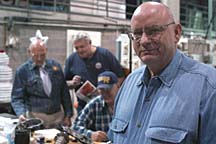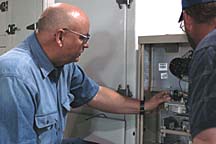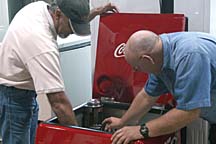
Some of these workers chose to enroll in Steve Fordham's HVACR program at the college. Fordham has been able to take many of these displaced workers and put them into the HVACR industry, giving them the opportunity to secure a good job and get back on their feet.
But Fordham is concerned with more than just helping students be-come technically proficient and find a job. The instructor's philosophy is that what you put in to the industry, you will get in return.
"This industry has been very good to me and my family," said Fordham. "I explain to my students that they can be happy, be successful, and look at their career as more than just work."
This philosophy, along with his unique teaching style, has earned Fordham recognition as a runner-up in The News' Instructor of the Year contest.

Getting Your Hands Dirty
Fordham graduated from Utah Valley State College over 30 years ago. He entered the field and worked as a service tech, then later worked for a wholesaler. While working for the distributor, Fordham took on the responsibility of teaching other technicians and contractors in the local dealer network.In 1981 the opportunity came about for Fordham to teach part-time at his alma mater. By 1989, he had moved in as a full-time instructor.
"I've always enjoyed the teaching side of the business," said Fordham. "I like to see the light come on for someone who has been struggling with a concept."
Fordham not only brought his flair for teaching to the college, he brought along a strong emphasis on real-world learning.
"The most effective part of our program is the fact that our degree is so hands-on," said the instructor. "A lot of our students are able to get their hands dirty and get experience in the community."
One of the best examples of this is the program's involvement with the local food bank.
A co-worker on campus who was a member of the food bank's board came to Fordham and explained that the charitable organization could use a little help. The food bank did not have refrigerators or freezers large enough to accept some donations. The nearby Stouffer's frozen food facility was willing to give the food bank large donations of food, but the lack of freezer space caused the food bank to reluctantly turn these donations away.

Throughout the year, Fordham and his students helped to support the food bank by installing a second walk-in freezer. And when the food bank moved to a new facility, the HVACR program helped with all the work to get the charity up and running again. Currently, Fordham said that if there are general service needs or maintenance, he and his students respond to the food bank and treat it like a regular service call.
Even Fordham's school has benefited from his expertise and the willingness of the students. The program has been responsible for servicing the freezers and refrigerators at the school's cafeteria, as well as the air conditioning and heating at the school's child care facility.
In addition, Fordham and his students have responded to heating and cooling needs at the local high schools and secondary vocational schools. Fordham said that many of the high school students see what the college students are doing with the HVAC systems, and the experience will pique their interest.
"We have a good exchange with the [high school] students, and we talk to them about what we are doing," Fordham said.
Learning Harder Lessons
Fordham makes sure that his students learn about the equipment they will run into in the field, but he also emphasizes the everyday challenges that will come with the job.Recently, the college began offering business ethics courses for many of the degree programs. HVAC was not one of the mandatory areas for this program, but Fordham decided to integrate an ethics portion into his course.
"We've found from employers that they want their people to know what is involved on the business side," said Fordham.
He also explained that local contractors want technicians who not only can do a job and do it right, but can be trusted in the field to do what is ethically right. That means doing a job fairly and treating the customer with respect.
"We present to [the students] real-world situations and ask them how they would handle them and discuss possible ways to do so," Fordham said. "We also ask them to present situations they have been faced with, and we discuss those as well."
He explained that this helps to create dialogue among the students and gets them thinking about the obstacles in the field that can't be solved with a textbook or math equation.
"My teaching philosophy is more than a philosophy," said Fordham. "It is a way of life, or, more correctly, it is life. If I can be successful in helping my students reach the potential that lives within each of them, then I will feel that I have done what teaching is suppose to do."
Publication date: 10/27/2003


Report Abusive Comment